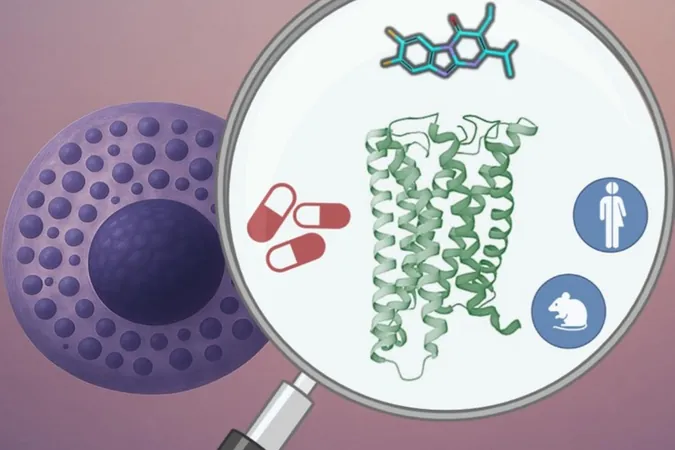
Revolutionary New Compound Could Halt Life-Threatening Inflammatory Reactions Like IBS and Asthma!
2025-04-25
Author: Jessica Wong
Meet the Heroes: Mast Cells and Their Perilous Role
Mast cells are essential warriors of our immune system, defending against invaders like viruses, bacteria, and even toxins from snake and insect bites. When these cells sense danger, they spring into action, producing mucus, causing swelling and itching, and tightening muscles in the airways, stomach, and intestines. However, when mast cells go overboard, they can ignite allergic reactions, leading to serious and sometimes fatal conditions.
A Breakthrough Compound: The Future of Allergy Treatment?
In a groundbreaking study recently published in 'Signal Transduction and Targeted Therapy,' researchers unveiled a new compound that could potentially block mast cells from activating harmful reactions. This includes notoriously tough conditions like irritable bowel syndrome (IBS), asthma, chronic itching, and migraines, which were once thought to be pseudo-allergic reactions but are now recognized as a form of allergy.
Co-author Christa Müller from the University of Bonn expressed optimism about the discovery, stating, "We thus see this as an extremely promising substance." The compound exhibits the ability to significantly diminish symptoms and, crucially, reduce the risk of fatalities.
Understanding the Mechanism: A Unique Trigger
Unlike traditional allergic reactions, where antibodies alert mast cells, these challenging conditions arise from direct activation of mast cells, prompting complex and hard-to-treat responses. "This triggers reactions of a specific nature that have been difficult to treat," Müller explained.
The Long Road to Discovery
Fifteen years ago, Müller and her team discovered a receptor called MRGPRX2 on mast cells that activates these troubling reactions when certain molecules bind to it. The pivotal question was, how could they block this switch?
To answer this, the team sifted through 40,000 compounds previously gathered by Müller’s department, seeking ones that could effectively inhibit the receptor. Using cells that illuminate upon MRGPRX2 activation, Ghazl Al Hamwi, Müller’s doctoral student and lead author, elaborated, "We could test if the substances stopped the activation, switching off the light signal." This process led them to a molecule that effectively blocks the receptor.
Promising Results: A Life-Saving Solution?
They then developed a treatment based on this molecule, which proved effective in very low doses, eliminating life-threatening allergic reactions in lab mice and blocking MRGPRX2 receptor activity in isolated human mast cells. Importantly, they found that the molecule targets only the intended receptor, thus minimizing side effects.
Looking Ahead: A Glimmer of Hope for Patients
While Al Hamwi, Müller, and their colleagues have enhanced the compound's effectiveness and duration, extensive animal and eventual human trials are necessary before it can be approved for widespread use. Nevertheless, this innovative compound holds incredible life-saving potential for individuals battling certain inflammatory conditions and those at risk of anaphylactic shock. The future of allergy treatment could be here!

 Brasil (PT)
Brasil (PT)
 Canada (EN)
Canada (EN)
 Chile (ES)
Chile (ES)
 Česko (CS)
Česko (CS)
 대한민국 (KO)
대한민국 (KO)
 España (ES)
España (ES)
 France (FR)
France (FR)
 Hong Kong (EN)
Hong Kong (EN)
 Italia (IT)
Italia (IT)
 日本 (JA)
日本 (JA)
 Magyarország (HU)
Magyarország (HU)
 Norge (NO)
Norge (NO)
 Polska (PL)
Polska (PL)
 Schweiz (DE)
Schweiz (DE)
 Singapore (EN)
Singapore (EN)
 Sverige (SV)
Sverige (SV)
 Suomi (FI)
Suomi (FI)
 Türkiye (TR)
Türkiye (TR)
 الإمارات العربية المتحدة (AR)
الإمارات العربية المتحدة (AR)